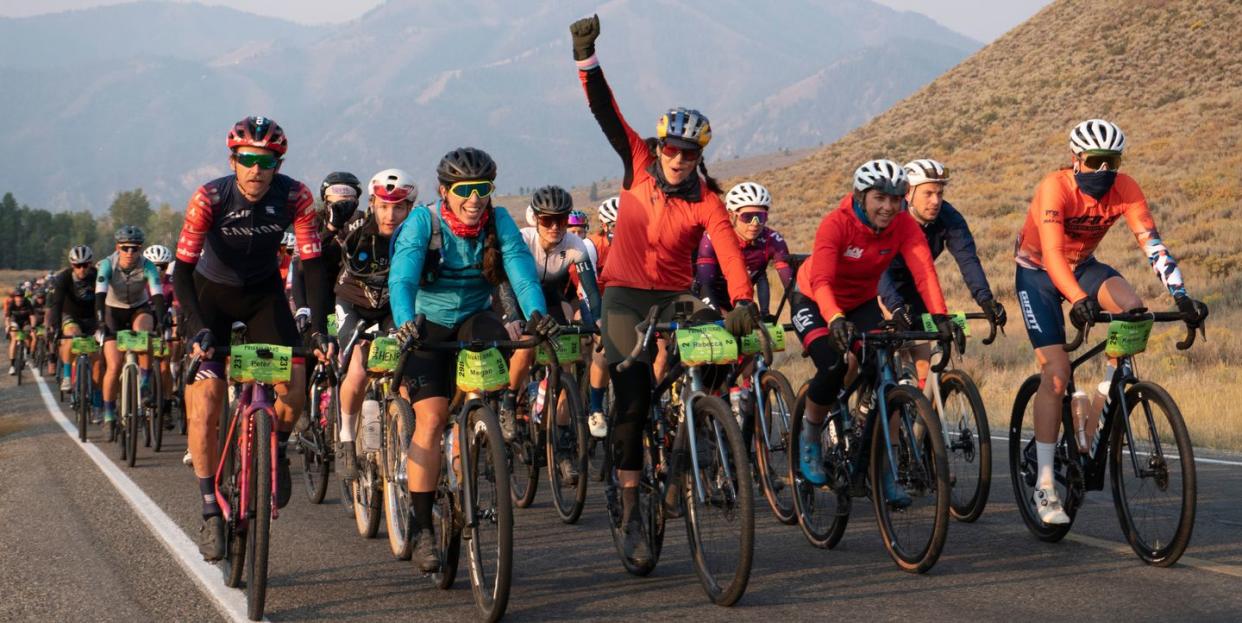This Bike Race Added a Non-Binary Category. More Should Do the Same.

Nine years ago, Rebecca Rusch—a professional mountain biker, entrepreneur, and philanthropist—launched her gravel bike event, Rebecca’s Private Idaho, in her home of Ketchum, Idaho. At the time, gravel biking wasn’t really a thing yet, but Rusch, 53, wanted to create an inclusive event for folks who weren’t seasoned mountain bikers, but still wanted to enjoy the mountains.
“I’ve always wanted people to feel welcomed to come ride here,” Rusch told Bicycling. “From year one that was the mission, whether they were a pro or someone new to cycling, so that hasn’t changed.”
What has changed over the years is how to make everyone feel included. Shorter distances were added as a way for the event to be less intimidating for beginners, and the stage race was implemented, so that people could experience all kinds of riding and push themselves in different ways.
For the 2021 race, from September 2 through 5, she really stepped up that mission and offered a number of different distances. The Queen’s Stage Race consisted of 196 miles over three stages. Then, the main events varied in mileage: the Baked Potato (102 miles), the French Fry (56 miles), and the Tater Tot (20 miles).
This year Rusch also added new categories for riders that have been underrepresented in bike racing in the past: A Non-Binary/FTW (Femme, Transgender, Women) category, and a para category. This was important, Rusch said, because it’s crucial for people to see examples of themselves in order to join.
“With my platform as an athlete, I feel responsible to use it for good. The name of my foundation is Be Good, and that really has become a mission of mine. I want to use the platforms that I have to affect change.”
Rusch said that making a lot of the changes to her event was easy, but she was initially held back because she was afraid of not doing it correctly. However she learned that you have to start somewhere and know where you can improve next time.
“Even this year, we didn’t have all the para categories, but we will next year,” Rusch said. “You have to do it as best you can, and then continue to grow and evolve.”
One of Rusch’s biggest messages is to reach out and ask for help from people who know more than you. This year, Rusch spoke with Meg Fisher and Muffy Davis, both of whom are well-known in the paracycling world; Molly Cameron, the founder of the RIDE organization; Austin Killips; and Bethel Steele.
The atmosphere at this year’s race was “overwhelmingly positive,” with plenty of healthy discussion and learning opportunities. Rusch said that there were questions about why people were riding in certain categories, but there was no defensiveness or anger. “What it comes down to is that the bike is the common ground. We just all love to ride bikes,” Rusch said.
This year Rebecca’s Private Idaho saw 33% participation from women, which is something other events strive for.
“Historically we’ve had really high female participation — 30% and above every year. And that wasn’t a program — it wasn’t like we set out to invite more women. But I think because I am a woman and an athlete, naturally more women came. Typically, at these endurance events [especially 9 years ago] participation by women was more like 10%.”
Rusch said it’s crucial for people to see examples of themselves in order to join. The more trans athletes at events, the more trans athletes realize this is for them. The more para athletes at events, the more para athletes see that there’s a place for them.
In the future, Rusch plans to implement even more signage and language honoring indigenous people; she’s been working to connect with the indigenous community and learn more about the places where we ride.
“I’m a white woman, and so I know my experience, but it’s been amazing to learn from so many others. So many people have been so open about helping to educate,” Rusch said. “[My friend, renowed bikepacker Alexandera Houchin, and I] had a lot of conversations about word choice, and she said something to me that stuck. She said, ‘there’s power in an invitation. Invite them with open arms and an open heart.’ So she was a great resource in teaching me about indigenous territories and where we are.”
Rebecca’s Private Idaho has historically had high female participation—30% and above every year—and that didn’t change this year. In 2021, the race saw 33% participation from women, which is something other events strive for.
When people say that they wish something like Rebecca’s Private Idaho existed near them, Rusch says to those people, make it happen.
“You don’t have to have a 1,500-person event to make an impact. You can take a neighbor bike riding and have an absolute impact on them. You may not think you have a platform that’s big enough, but if everyone took one person on a bike ride, just imagine how the world would change. Instead of complaining that things don’t exist where you are, think about what you can do about it.”
But Rusch’s biggest takeaway? Make sure it’s fun.
“We had a full podium of non-binary athletes and para athletes. This was the first time that’s happened in gravel biking. But, it won’t be the last. And that makes me really happy. The world is watching, and not just in gravel—in all sports.”
You Might Also Like

